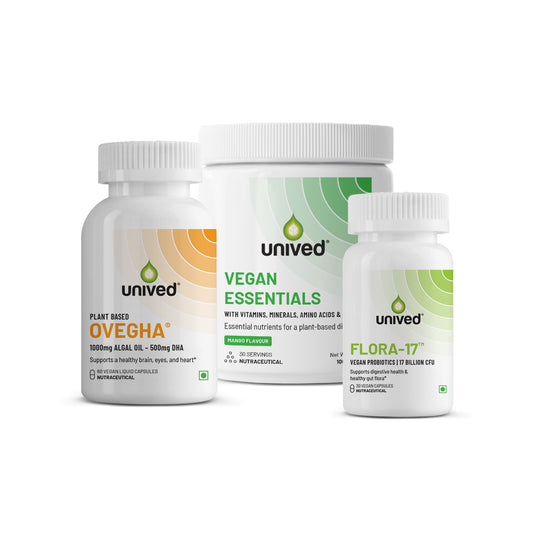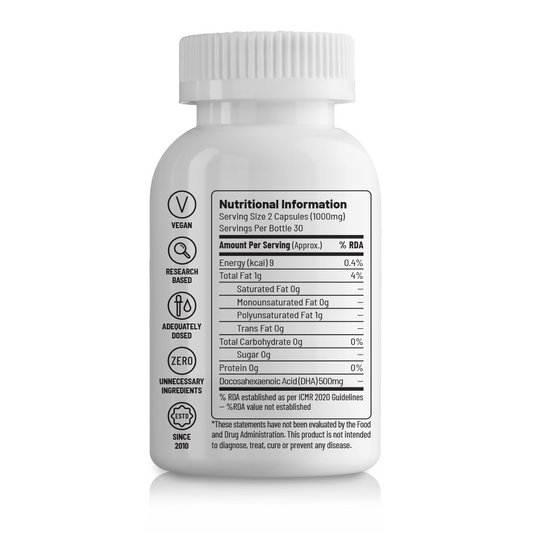Vegan and plant-based diets popularity is growing day by
day. Vegan and vegetarian diet-consuming individuals have a lower risk of
developing coronary heart disease (CHD), colorectal cancer, diabetes, obesity,
and lower LDL. A diet rich in vegetables, fruits, nuts, and whole grains is
often responsible for several health benefits. Although vegetarian and vegan
diets can lead to deficiencies of certain vitamins (vitamin B12, vitamin B9,
and Vitamin D), minerals (calcium, iron, zinc, iodine), and trace elements,
which are present in animal products and lacks or are difficult to obtain from
a vegan source. It is important to ensure that vegan diets meet both health and
performance needs, basic dietary requirements have to be met and sport specific
diet-related objectives need to be achieved.
Unived’s Vegan Essential is designed to fill the nutrition
gaps in vegan and vegetarian diets. It is developed to provide a range of
multivitamins, minerals, and other essential nutrients which are often lacking
in a vegan diet but play a crucial role in maintaining the body’s healthy
functions.
Our Formulation
Unived’s Vegan Essentials is conscientiously formulated with
a blend of ingredients to fill and meet the nutritional demands of vegan and
vegetarian individuals.
A. UNI-V5 Blend:
- L-Taurine, L-Lysine HCL, Soy Phospholipids (Standardized to
50% Phosphatidylcholine), MenaquinGold® as Menaquinone-7 from Fermented
Chickpeas, Vitashine™ as Cholecalciferol from Lichen.
B. Vitamin B Complex Blend:
- Tulsi Extract (Ocimum sanctum Leaves Extract), Sunflower
Extract (Helianthus annuus Seed Extract), Papaya Extract (Carica papaya
L.Leaves Extract), Lemon Peel Extract (Citrus limon Fruit Peel Extract),
Sesbania grandiflora Leaves Extract, Spirulina Extract (Arthrospora plantensis
Extract).
C. Super Greens Blend:
- Organic Chlorella Powder, Organic Spirulina Powder.
D. Mineral Blend:
- Ferrous BisGlycinate, Zinc Citrate, Moringa Leaves Extract
(Moringa oleifera Extract), Mustard Seed Extract (Brassica nigra Extract).
Role of Ingredients:
Vitamin D:
- Vitamin D is one of the key nutrients for maintaining bone
health and overall wellness. Vegan and vegetarian diet often lacks, Vitamin D. - Vitamin D regulates the absorption of calcium and phosphorus
in the bones, helps in bone mineralization, and aids in inter-communication
throughout the body. It helps in achieving strong muscles, and better immune,
mental, heart, and dental health.
Vitamin K:
- Vitamin K2 is referred to as menaquinone. and its main roles
are to support calcium metabolism and prevent calcification of the arteries and
direct Calcium where it belongs. Helps maintain strong bones, supports
cardiovascular health, and relieves muscle cramps. - Only some fermented food like cheeses and other animal
products contain vitamin K2. Therefore vitamin K2 consumption is nil in vegans
unless, of course, they consume Japanese natto beans.
B Complex Vitamins:
- Thiamine (B1): is part of the coenzyme thiamin
pyrophosphate, which helps in the breakdown of glucose and energy. - Riboflavin (B2) – is a part of two coenzymes (flavin
mononucleotide and flavin adenine dinucleotide). The two coenzymes are involved
in oxidation-reduction reactions during energy production within the metabolic
pathways. It helps extract energy from glucose, fatty acids, and amino acids. - Niacin (B3) – it plays a critical role in breaking down
carbohydrates and fatty acids during exercise. Its other role is to repair and
replicate cells post-exercise. - Pyridoxine (B6) – Our body cannot synthesize sufficient
quantities of all amino acids without vitamin B6. Pyridoxine helps deliver
oxygen throughout pur body and helps nerve cells communicate. Pyridoxine also
works with folate and vitamin B12 to lower homocysteine levels in the blood. - Folate (B9) – is involved with DNA synthesis and the
mutation of red blood cells and other cells. It also helps decrease
homocysteine levels and is involved in amino acid metabolism.
Vitamin B12:
- Vitamin B12 is important for the functions of the nervous
system, homocysteine metabolism, and DNA synthesis, especially in erythrocytes.
It also helps in the utilization of proteins, carbohydrates, and fats and is
known to increase endurance capability, help in the production of new red blood
cells, and repair damaged muscles. - Vitamin B12 is more abundant in animal-based food than in
plant-based food. Athletes with a lower intake of B12 like vegetarian and vegan
athletes could be at a disadvantage because of it.
Iron:
- Iron helps deliver oxygen to cells and tissues in our body.
It also helps maintain energy levels and keep levels of oxygen in our muscles. - A vegetarian diet contains iron but it contains non-heme
iron, which generally is not absorbable as heme iron. Therefore there is a
concern regarding iron deficiency in vegetarians. Iron absorption depends on
enhancers and inhibitors present in foods.
Zinc:
- Zinc is a constituent of enzymes involved in metabolic
processes that relate to DNA stabilization and gene expression, and is
important in cell growth, repair, and protein metabolism. - Zinc is present in abundance in a vegetarian diet, but it is
not absorbed readily from plant foods as these foods contain phytate, which
inhibits the absorption of zinc. Due to its poor bioavailability, it is
suggested that vegetarians and vegans should consume 50% more as compared to
non-vegetarians.
Iodine:
- Iodine is an essential trace element needed for physical and
mental growth and development and plays an important role in thyroid function
and metabolism. - A 2003 study of vegans in Germany estimated that only about
40% of the daily requirements for Iodine commonly was met on a vegan diet.
Another study based on iodine excretion concluded that 80% of vegans, 25% of
vegetarians, and 9% of conventional eaters are iodine deficient.
Taurine:
- It is an amino acid that offers performance benefits to
athletes. It plays a role in many important physiological processes such as
bile acid conjugation, cardiovascular function, neurotransmission, and
euglycemia. Taurine supplementation is beneficial to vegans as it lacks in
their diet.
L- Lysine:
- Lysine produces carnitine which helps convert fatty acids
into energy. - Most vegans and vegetarians consume a sufficient amount of
amino acids. L-Lysine is absent in cereals. Thereforevegan and vegetarians who
follow a limited grain-based diet have a chance to consume inadequate amounts
of lysine.
Choline:
- Choline is an important nutrient for the brain. Liver, and
muscle functions. It also takes part in lipid metabolism and is a part of cell
membrane composition. Therefore it gives structure to the cell and helps in the
repair. - Humans can synthesize choline in a small amount therefore
most of the choline requirement is fulfilled by either diet or suplementation.
Choline is predominantly present in animal-derived foods. Therefore, vegans and
vegetarians are at high risk of deficiency.
Spirulina:
- Spirulina is considered a superfood. It contains a blue
pigment protein called Phycocyanin, which is bioavailable. It plays role in
supporting the immune system. The other nutrients present in the superfood also
help in strengthening immunity.
Chlorella:
- Chlorella is a nutrient-dense superfood that is high in
chlorophyll. The phytonutrients present in the chlorella help to maintain
overall wellness. It supports immunity and helps in detoxification.
What is the suggested use of Unived Vegan Essentials?
Adults take 1 scoop daily with 200mL of water post lunch or as suggested by your healthcare practitioner.
Can I take it with multivitamins?
Vegan essentials contains nutrients that are generally lacking in vegan or vegetarian diet. If you take another supplement that contains any of the nutrients in the product, yoy may exceed the RDA of that nutrient. To avoid the double dose you can take multivitamins and vegan essentials alternatively. Speak with your healthcare practitioner before taking any supplement.






 Sold outVendor:Vegan Health
Sold outVendor:Vegan Health






